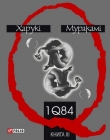
Текст книги "1q84"
Автор книги: Haruki Murakami
Жанр:
Современная проза
сообщить о нарушении
Текущая страница: 42 (всего у книги 81 страниц)
CHAPTER 15
Aomame
TIME NOW FOR GHOSTS
Aomame took a spare blanket from the closet and laid it over the man’s big body. Then she placed a finger on the back of his neck again and confirmed that his pulse had completely stopped. This man they called “Leader” had already moved on to another world. What kind of world that was, she could not be sure, but it was definitely not 1Q84. In this world, he had now become what would be called “the deceased.” The man had crossed the divide that separates life and death, and he had done so without making the slightest sound, with just a momentary shiver, as if he had felt a chill. Nor had he shed a drop of blood. Now he had been released from all suffering, lying silent and dead, facedown on the blue yoga mat. As always, her work had been swift and precise.
She placed the cork on the needle and returned the ice pick to the hard case. This went into the gym bag. She took the Heckler & Koch from the vinyl pouch and slipped it under the waistband of her sweatpants, safety released and bullet in the chamber. The hard metal against her backbone reassured her. Stepping over to the window, she pulled the thick curtain closed and made the room dark again.
She picked up the gym bag and headed for the door. With her hand on the knob, she turned for one last look at the large man lying in the dark room. He appeared only to be sound asleep, as he had when she first saw him. Aomame herself was the only person in the world who knew that he was no longer alive. No, the Little People probably knew, which was why they had stopped the thunder. They knew it would be useless to go on sending such warnings. The life of their chosen agent had come to an end.
Aomame opened the door and stepped into the bright room, averting her eyes from the glare. She closed the door soundlessly. Buzzcut was sitting on the sofa, drinking coffee. On the table was a coffeepot and a large room service tray holding a stack of sandwiches. The sandwiches were half gone. Two unused coffee cups stood nearby. Ponytail was sitting in a rococo chair beside the door, his back straight, as he had been earlier. It seemed as though both men had spent the whole time in the same position, saying nothing. Such was the reserved atmosphere that pervaded the room.
When Aomame came in, Buzzcut set his coffee cup onto its saucer and quietly stood up.
“I’m through,” Aomame said. “He’s asleep now. It took quite a while. I think it was hard on his muscles. You should let him get some sleep.”
“He’s sleeping?”
“Very soundly,” Aomame said.
Buzzcut looked Aomame straight in the face. He peered deep into her eyes. Then he slowly moved his gaze down to her toes and back again, as if to inspect for possible irregularities.
“Is that normal?”
“Many people react that way, falling into a deep sleep after they have been released from extreme muscular stress. It is not unusual.”
Buzzcut walked over to the bedroom door, quietly turned the knob, and opened the door just enough to peer inside. Aomame rested her right hand on the waist of her sweatpants so that she could take the pistol out as soon as anything happened. The man spent some ten seconds observing the situation in the bedroom, then finally drew his face back and closed the door.
“How long do you think he will sleep?” he asked Aomame. “We can’t just leave him lying on the floor like that forever.”
“He should wake up in two hours or so. It would be best to leave him in that position until then.”
Buzzcut checked his watch and gave Aomame a slight nod.
“I see. We’ll leave him like that for a while,” Buzzcut said. “Would you like to take a shower?”
“I don’t need to shower, but let me change my clothes again.”
“Of course. Please use the powder room.”
Aomame would have preferred not to change her clothes and to get out of there as quickly as possible, but she had to be sure not to arouse their suspicions. She had changed clothes when she arrived, so she must change her clothes on her way out. She went into the bathroom and took off her sweat suit and her sweat-soaked underwear, dried her body with a bath towel, and put on fresh underwear and her original cotton pants and blouse. She shoved the pistol under her belt so that it would not be visible from the outside. She tested various movements of her body to make sure that they would not appear unnatural. She washed her face with soap and water and brushed her hair. Facing the large mirror over the sink, she twisted her face into every scowl she could think of in order to relax any facial muscles that had stiffened from tension. After continuing that for a while, she returned her face to normal. After such prolonged frowning, it took her some moments to recall what her normal face even looked like, but after several attempts she was able to settle on a reasonable facsimile. She glared into the mirror, studying her face in detail. No problem, she thought. This is my normal face. I can even smile if I have to. My hands are not shaking, either. My gaze is steady. I’m the usual cool Aomame.
Buzzcut, though, had stared hard at her when she first came out of the bedroom. He might have noticed the streaks left by her tears. There must have been something left after all that crying. The thought made Aomame uneasy. He must have found it odd that she would have had to shed tears while stretching a client’s muscles. It might have led him to suspect that something strange had occurred. He might have opened the bedroom door, gone in to check on Leader, and discovered that his heart had stopped …
Aomame reached around to check the grip of her pistol. I have to calm down, she told herself. I can’t be afraid. Fear will show on my face and raise suspicions.
Resigning herself to the worst, Aomame cautiously stepped out of the bathroom with the gym bag in her left hand, right hand ready to reach for the gun, but there was no sign of anything unusual in the room. Buzzcut stood in the center, his arms folded, eyes narrowed in thought. Ponytail was still in the chair by the door, coolly observing the room. He had the calm eyes of a bomber’s tail gunner, accustomed to sitting there all alone, looking at the blue sky, eyes taking on the sky’s tint.
“You must be worn out,” Buzzcut said. “How about a cup of coffee? We have sandwiches, too.”
“Thanks, but I’ll have to pass on that. I can’t eat right after work. My appetite starts to come back after an hour or so.”
Buzzcut nodded. Then he pulled a thick envelope from his inner jacket pocket. After checking its weight, he handed it to Aomame.
The man said, “I believe you will find here something more than the agreed-upon fee. As I said earlier, we strongly urge you to keep this matter a secret.”
“Hush money?” Aomame said jokingly.
“For the extra effort we have put you through,” the man said, without cracking a smile.
“I have a policy of strict confidentiality, whatever the fee. That is part of my work. No word of this will leak out under any circumstances,” Aomame said. She put the unopened envelope into her gym bag. “Do you need a receipt?”
Buzzcut shook his head. “That will not be necessary. This is just between us. There is no need for you to report this as income.”
Aomame nodded silently.
“It must have taken a great deal of strength,” Buzzcut said, as if probing for information.
“More than usual,” she said.
“Because he is no ordinary person.”
“So it would seem.”
“He is utterly irreplaceable,” he said. “He has suffered terrible physical pain for a very long time. He has taken all of our suffering and pain upon himself, as it were. We can only hope that he can have some small degree of relief.”
“I can’t say for sure because I don’t know the basic cause of his pain,” Aomame said, choosing her words carefully, “but I do think that his pain may have been reduced somewhat.”
Buzzcut nodded. “As far as I can tell, you seem quite drained.”
“Perhaps I am,” Aomame said.
While Aomame and Buzzcut were speaking, Ponytail remained seated by the door, wordlessly observing the room. His face was immobile; only his eyes moved. His expression never changed. She had no idea whether he was even hearing their conversation. Isolated, taciturn, attentive, he kept watch for any sign of enemy fighter planes among the clouds. At first they would be no bigger than poppy seeds.
After some hesitation, Aomame asked Buzzcut, “This may be none of my business, but drinking coffee, eating ham sandwiches: are these not violations of your religion?”
Buzzcut turned to look at the coffeepot and the tray of sandwiches on the table. Then the faintest possible smile crossed his lips.
“Our religion doesn’t have such strict precepts. Alcohol and tobacco are generally forbidden, and there are some prohibitions regarding sexual matters, but we are relatively free where food is concerned. Most of the time we eat only the simplest foods, but coffee and ham sandwiches are not especially forbidden.”
Aomame just nodded, offering no opinion on the matter.
“The religion brings many people together, so some degree of discipline is necessary, of course, but if you focus too much on formalities, you can lose sight of your original purpose. Things like precepts and doctrines are, ultimately, just expedients. The important thing is not the frame itself but what is inside the frame.”
“And your Leader provides the content to fill the frame.”
“Exactly. He can hear the voices that we cannot hear. He is a special person.” Buzzcut looked into Aomame’s eyes again. Then he said, “Thank you for all your efforts today. And luckily the rain seems to have stopped.”
“The thunder was terrible,” Aomame said.
“Yes, very,” Buzzcut said, though he himself did not seem particularly interested in the thunder and rain.
Aomame gave him a little bow and headed for the door, gym bag in hand.
“Wait a moment,” Buzzcut called from behind. His voice had a sharp edge.
Aomame came to a stop in the center of the room and turned around. Her heart made a sharp, dry sound. Her right hand casually moved to her hip.
“The yoga mat,” the young man said. “You’re forgetting your yoga mat. It’s still on the bedroom floor.”
Aomame smiled. “He is lying on top of it, sound asleep. We can’t just shove him aside and pull it out. I’ll give it to you if you like. It’s not expensive, and it’s had a lot of use. If you don’t need it, throw it away.”
Buzzcut thought about this for a moment and finally nodded. “Thank you again. I’m sure you’re very tired.”
As Aomame neared the door, Ponytail stood and opened it for her. Then he bowed slightly. That one never said a word, Aomame thought. She returned his bow and started to slip past him.
In that moment, however, a violent urge penetrated Aomame’s skin, like an intense electric current. Ponytail’s hand shot out as if to grab her right arm. It should have been a swift, precise movement—like grabbing a fly in thin air. Aomame had a vivid sense of its happening right there. Every muscle in her body stiffened up. Her skin crawled, and her heart skipped a beat. Her breath caught in her throat, and icy insects crawled up and down her spine. A blazing hot white light poured into her mind: If this man grabs my right arm, I won’t be able to reach for the pistol. And if that happens, I have no hope of winning. He feels it. He feels that I’ve done something. His intuition recognizes that something happened in this hotel room. He doesn’t know what, but it is something that should not have happened. His instincts are telling him, “You have to stop this woman,” ordering him to wrestle me to the floor, drop his whole weight on me, and dislocate my shoulders. But he has only instinct, no proof. If his feeling turns out to be wrong, he’ll be in big trouble. He was intensely conflicted, and now he’s given up. Buzzcut is the one who makes the decisions and gives the orders. Ponytail is not qualified. He struggled to suppress the impulse of his right hand and let the tension go out of his shoulder. Aomame had a vivid sense of the stages through which Ponytail’s mind had passed in that second or two.
Aomame stepped out into the carpeted hallway and headed for the elevator without looking back, walking coolly down the perfectly straight corridor. Ponytail, it seemed, had stuck his head out the door and was following her movements with his eyes. She continued to feel his sharp, knifelike gaze piercing her back. Every muscle in her body was tingling, but she refused to look back. She must not look back. Only when she turned the corner did she feel the tension go out of her. But still she could not relax. There was no telling what could happen next. She pushed the elevator’s “down” button and reached around to hold the pistol grip until the elevator came (which took an eternity), ready to draw the gun if Ponytail changed his mind and came after her. She would have to shoot him without hesitation before he put his powerful hands on her. Or shoot herself without hesitation. She could not decide which. Perhaps she would not be able to decide.
But no one came after her. The hotel corridor was hushed. The elevator door opened with a ring, and Aomame got on. She pressed the button for the lobby and waited for the door to close. Biting her lip, she glared at the floor number display. Then she exited the elevator, walked across the broad lobby, and stepped into a cab waiting for passengers at the front door. The rain had cleared up completely, but the cab had water dripping from its entire chassis, as if it had made its way here underwater. Aomame told the driver to take her to the west exit of Shinjuku Station. As they pulled away from the hotel, she exhaled every bit of air she was holding inside. Then she closed her eyes and emptied her mind. She didn’t want to think about anything for a while.
A strong wave of nausea hit her. It felt as if the entire contents of her stomach were surging up toward her throat, but she managed to force them back down. She pressed the button to open her window halfway, sending the damp night air deep into her lungs. Then she leaned back and took several deep breaths. Her mouth produced an ominous smell, as though something inside her were beginning to rot.
It suddenly occurred to her to search in her pants pocket, where she found two sticks of chewing gum. Her hands trembled slightly as she tore off the wrappers. She put the sticks in her mouth and began chewing slowly. Spearmint. The pleasantly familiar aroma helped to quiet her nerves. As she moved her jaw, the bad smell in her mouth began to dissipate. It’s not as if I actually have something rotting inside me. Fear is doing funny things to me, that’s all.
Anyhow, it’s all over now, Aomame thought. I don’t have to kill anyone anymore. And what I did was right, she told herself. He deserved to be killed for what he did. It was a simple case of just punishment. And as it happened (strictly by chance), the man himself had a strong desire to be killed. I gave him the peaceful death he was hoping for. I did nothing wrong. All I did was break the law.
Try as she might, however, Aomame was unable to convince herself that this was true. Only moments before, she had killed a far-from-ordinary human being with her own hands. She retained a vivid memory of how it felt when the needle sank soundlessly into the back of the man’s neck. That far-from-ordinary feeling was still there, in her hands, upsetting her to no small degree. She opened her palms and stared at them. Something was different, utterly different. But she was unable to discover what had changed, and how.
If she was to believe what he had told her, she had just killed a prophet, one entrusted with the voice of a god. But the master of that voice was no god. It was probably the Little People. A prophet is simultaneously a king, and a king is destined to be killed. She was, in other words, an assassin sent by destiny. By violently exterminating a being who was both prophet and king, she had preserved the balance of good and evil in the world, as a result of which she must die. But when she performed the deed, she struck a bargain. By killing the man and, in effect, throwing her own life away, she would save Tengo’s life. That was the content of the bargain. If she was to believe what he had told her.
Aomame had no choice but to believe fundamentally in what he had said. He was no fanatic, and dying people do not lie. Most importantly, his words had genuine persuasive power. They carried the weight of a huge anchor. All ships carry anchors that match their size and weight. However despicable his deeds may have been, the man was truly reminiscent of a great ship. Aomame had no choice but to recognize that fact.
Taking care that the driver did not see her, Aomame slipped the Heckler & Koch from her belt, set the safety catch, and put the gun in its pouch, relieving herself of 500 grams of solid, lethal weight.
“Wasn’t that thunder something?” the driver said. “And the rain was incredible.”
“Thunder?” Aomame said. It seemed to have happened a long time ago, though it had been a mere thirty minutes earlier. Yes, come to think of it, there had been some thunder. “Yes, really, incredible thunder.”
“The weather forecast said absolutely nothing about it. It was supposed to be beautiful all day.”
She tried to make her mind work. I have to say something. But I can’t think of anything good to say. My brain seems to have fogged over. “Weather forecasts are never right,” she said.
The driver glanced at Aomame in the rearview mirror. Maybe there was something funny about the way she spoke. The driver said, “I hear the water in the streets overflowed and ran down into the Akasaka-Mitsuke subway station onto the tracks. It was because the rain all fell in one small area. They stopped the Ginza Line and the Marunouchi Line. I heard it on the radio news.”
The concentrated downpour brought the subway to a stop. Will this have any influence on my actions? I’ve got to make my brain work faster. I go to Shinjuku Station to get my travel bag and shoulder bag out of a coin locker. Then I call Tamaru for instructions. If I’m going to have to use the Marunouchi Line from Shinjuku, things could get very messy. I only have two hours to make my getaway. Once two hours have gone by, they’ll begin to wonder why Leader isn’t waking up. They’ll probably go into the bedroom and discover that he’s drawn his last breath. They’ll go into action immediately.
“Do you think the Marunouchi Line is still not running?” Aomame asked the driver.
“I wonder. I really don’t know. Want me to turn on the news?”
“Yes, please.”
According to Leader, the Little People caused that downpour. They concentrated the intense rain on a small area in the Akasaka District and caused the subway to stop. Aomame shook her head. Maybe they did it on purpose. Things don’t always go according to plan.
The driver tuned the radio to NHK. They were broadcasting a music program—folk songs sung by Japanese singers popular in the late sixties. Having listened to such music on the radio as a girl, Aomame remembered it vaguely, but in no way fondly. If anything, the memories it called up for her were unpleasant ones, things she would rather not think about. She put up with it for a while, but there was no sign of news about the subway situation.
“Sorry, that’s enough. Could you please turn off the radio?” Aomame said. “I’ll just go to Shinjuku Station and see what’s happening.”
The driver turned off the radio. “That place will be jammed,” he said.
As the driver had said, Shinjuku Station was horribly congested. Because the stalled Marunouchi Line connected with the National Railways here, the flow of passengers had been disrupted, and people were wandering in all directions. The evening rush hour had ended, but even so, pushing her way through the crowd was hard work for Aomame.
At last she made her way to the coin locker and took out her shoulder bag and her black imitation-leather travel bag. The travel bag contained the cash she had taken from her safe-deposit box. She took the items out of her gym bag and divided them between the shoulder and travel bags: the envelope of cash she had received from Buzzcut, the vinyl pouch containing the pistol, the hard case with the ice pick. The now useless Nike gym bag she put into a nearby locker, inserted a hundred-yen coin, and turned the key. She had no intention of reclaiming it. It contained nothing that could be traced to her.
Travel bag in hand, Aomame walked around looking for a pay phone in the station. Crowds had formed at every phone. People stood in long lines, waiting their turn to call home and say they would be late because the train had stopped. Aomame put her face into a light frown. I guess the Little People are not going to let me get away that easily. Leader said they can’t touch me directly, but they can interfere with my movements through the back door, using other methods.
Aomame gave up on waiting her turn for a phone. Leaving the station, she walked a short distance, went into the first café she saw, and ordered an iced coffee. The pink pay phone here was also in use, but at least it had no line. She stood behind a middle-aged woman and waited for her long conversation to end. The woman flashed annoyed glances at Aomame but resigned herself to hanging up after she talked for five more minutes.
Aomame slipped all her coins into the phone and punched in the number she had memorized. After three rings, a mechanical recorded announcement came on: “Sorry, but we can’t come to the phone right now. Please leave a message after the beep.”
The beep sounded, and Aomame said into the mouthpiece, “Hello, Tamaru, please pick up if you’re there.”
Someone lifted the receiver, and Tamaru said, “I’m here.”
“Good!” Aomame said.
Tamaru seemed to sense an unusual tension in her voice. “Are you all right?” he asked.
“For now.”
“How did the job go?”
Aomame said, “He’s in a deep sleep. The deepest sleep possible.”
“I see,” Tamaru said. He sounded truly relieved, and it colored his voice. This was unusual for him. “I’ll pass on the news. She’ll be glad to hear it.”
“It wasn’t easy.”
“I’m sure it wasn’t. But you did it.”
“One way or another,” Aomame said. “Is this phone safe?”
“I’m using a special circuit. Don’t worry.”
“I got my bags out of the Shinjuku Station coin locker. Now what?”
“How much time do you have?”
“An hour and a half,” Aomame said. She explained briefly. After another hour and a half, the two bodyguards would check the bedroom and find that Leader was not breathing.
“An hour and a half is plenty,” Tamaru said.
“Do you think they’ll call the police right away?”
“I don’t know. Just yesterday, the police went into the group’s headquarters to start an investigation. They’re still at the questioning stage and haven’t launched the investigation itself, but it could be real trouble for them if the head of the religion suddenly turned up dead.”
“You think they might just handle it themselves without making anything public?”
“That would be nothing for them. We’ll know what happened when we see tomorrow’s newspaper—whether they reported the death or not. I’m no gambler, but if I had to make a bet, I’d put my money on their not reporting it.”
“They won’t just assume it happened naturally?”
“They won’t be able to tell by appearances. And they won’t know whether it was a natural death or murder without a meticulous autopsy. In any case, the first thing they’re going to want to do is talk to you. You were the last one to see him alive, after all. And once they learn that you’ve cleared out of your apartment and gone into hiding, they’ll be pretty sure it was no natural death.”
“So then they’ll start looking for me—with every resource at their disposal.”
“That’s for sure,” Tamaru said.
“Do you think we can manage to keep me hidden?”
“We’ve got it all planned out—in great detail. If we follow the plan carefully and persistently, no one’s going to find you. The worst thing would be to panic.”
“I’m doing my best,” Aomame said.
“Keep it up. Act quickly and get time on your side. You’re a careful and persistent person. Just keep doing what you’re doing.”
Aomame said, “There was a huge downpour in the Akasaka area, and the subways have stopped running.”
“I know,” Tamaru said. “Don’t worry, we weren’t planning for you to use the subway. You’ll be taking a cab and going to a safe house in the city.”
“In the city? Wasn’t I supposed to be going somewhere far away?”
“Yes, of course you will be going far away,” Tamaru said slowly, as if spelling things out for her. “But first we have to get you ready—change your name and your face. And this was a particularly tough job: you must be all keyed up. Nothing good can come of running around crazily at a time like this. Hide out in the safe house for a while. You’ll be fine. We’ll provide all the support you need.”
“Where is this ‘safe house’?”
“In the Koenji neighborhood. Maybe twenty minutes from where you are now.”
Koenji, Aomame thought, tapping her nails against her teeth. She knew it was somewhere west of the downtown area, but she had never set foot there.
Tamaru told her the address and the name of the condo. As usual, she took no notes but engraved it on her brain.
“On the south side of Koenji Station. Near Ring Road 7. Apartment 303. Press 2831 to unlock the front door.”
Tamaru paused while Aomame repeated “303” and “2831” to herself.
“The key is taped to the bottom of the doormat. The apartment has everything you’ll need for now, so you shouldn’t have to go out for a while. I’ll make contact from my end. I’ll ring the phone three times, hang up, and call again twenty seconds later. We’d like to avoid having you call.”
“I see,” Aomame said.
“Were his men tough?” Tamaru asked.
“There were two of them, and both seemed pretty tough. I had some scary moments. But they’re no pros. They can’t touch you.”
“There aren’t too many people like me.”
“Too many Tamarus could be a problem.”
“Could be,” Tamaru said.
. . .
Carrying her bags, Aomame headed for the station’s taxi stand, where she encountered another long line. Subway operations had still not returned to normal, it seemed. She had no choice but to take her place in line.
Joining the many other annoyed-looking commuters and patiently waiting her turn, Aomame mentally repeated the safe house address, the name of the building and apartment number, the code for unlocking the front door, and Tamaru’s phone number. She was like an ascetic sitting on a rock on a mountaintop, intoning his precious mantra. Aomame had always had confidence in her powers of memory. She could easily memorize those few bits of information. But these figures were now a lifeline. If she forgot even one of them in this situation, it could put her survival in jeopardy. She had to make sure they were engraved on her brain.
By the time Aomame finally got a taxi, a full hour had passed since she had left Leader’s corpse in the hotel room. So far, it was taking her twice as long as she had planned—a delay that the Little People had caused, no doubt. No, it could be sheer coincidence. Maybe I’m just letting the specter of some nonexistent “Little People” frighten me.
Aomame gave the driver her destination and then settled back in the seat, closing her eyes. Right about now, those two guys in their dark suits are probably checking their watches and waiting for their guru to wake up. Aomame pictured them. Buzzcut was drinking coffee and thinking about all sorts of things. Thinking was his job. Thinking and deciding. Maybe he had grown suspicious: Leader’s sleep was all too quiet. But Leader always slept soundly, without making noises—no snoring or even heavy breathing. Still, there was always his presence. The woman had said that Leader would be sound asleep for at least two hours, that it was important to let him rest quietly so that his muscles could recover. Only an hour had gone by, but something was bothering Buzzcut. Maybe he should check on Leader’s condition. What should he do?
Ponytail was the dangerous one, though. Aomame still had a vivid image of that momentary hint of violence he had displayed as she was leaving the hotel room. He was silent, but his instincts were sharp. His fighting skills must also be outstanding—probably much more so than she had imagined until that moment. Her own command of martial arts was surely no match for his. In a fight, he would probably not give her a chance to reach for her gun. Fortunately, though, he was no professional. He had let his rational mind interfere before he put his intuition into action. He was used to taking orders—unlike Tamaru. Tamaru would subdue his opponent and render him powerless before thinking. Action came first—trust the instincts and let rational judgments come later. A split-second’s hesitation and it was all over.
Recalling that moment at the door, Aomame felt her underarms growing moist. She shook her head. I was just lucky. At least I avoided being captured on the spot. I have to be a lot more careful from now on. Tamaru was right: the most important things are to be careful and persistent. Danger comes the moment you relax.
The driver was a polite-spoken middle-aged man. He pulled out a map, stopped the car, turned off the meter, and kindly found the exact location of the condo building. Aomame thanked him and stepped out of the cab. It was a handsome new six-story building in the middle of a residential area. There was no one at the entrance. Aomame punched in 2831 to unlock the front door, went inside, and rode a clean but narrow elevator up to the third floor. The first thing she did upon exiting the elevator was find the location of the emergency stairway. Then she removed the key taped to the back of the doormat of apartment 303 and used it to go inside. The entryway lights were set to go on automatically when the door opened. The place had that new-apartment smell. All of the furniture and appliances looked brand-new and unused, as if they had just come out of the boxes and plastic wrapping—matching pieces that could have been chosen by a designer to equip a model condo: simple, functional design, free of the smell of daily life.





